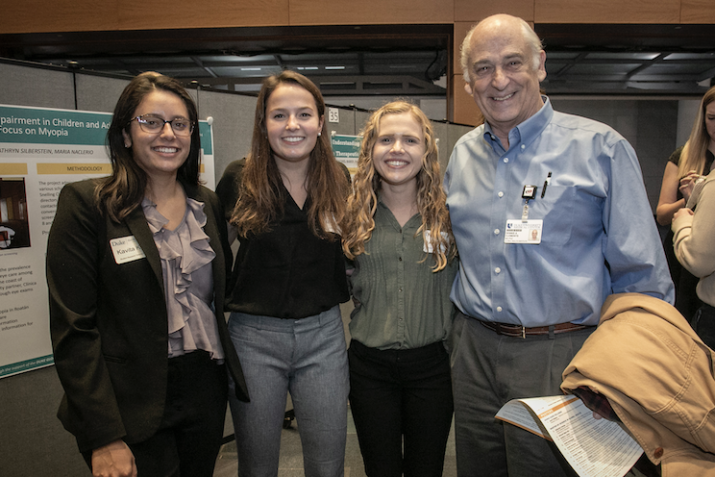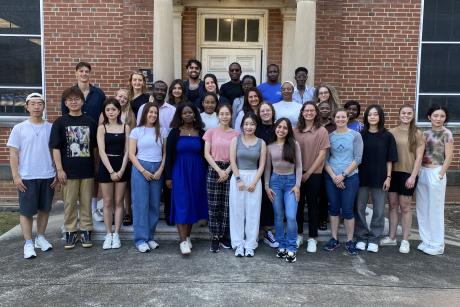
Students Kavita Krell, Maria Naclerio, and Kathryn Silberstein with Dennis Clements, professor of pediatrics, community and family medicine, and DGHI global health senior advisor.
Published November 12, 2019, last updated on September 29, 2021 under Education News
“Global health research prioritizes people and relationships.”
That’s how Duke fourth-year medical student Aarti Thakkar summed up global health research when she spoke to an upbeat crowd of more than 75 students and dozens of other attendees—Duke faculty and staff, friends and family—at the 2019 Global Health Research Showcase.
The eighth annual DGHI event took place at the School of Medicine’s Trent Semans Center for Health Education on the evening of Nov. 4. Forty-four posters by students spanned research conducted in 18 countries on four continents.
Walking through the rows of posters and listening to Duke undergraduate and master’s students sharing their projects, echoes of Thakkar’s words were everywhere. Whether research was undertaken in Tanzania, Madagascar, Kenya or Peru, projects were rooted in community experiences. As students described their data and research, they shared stories of families and individuals they’d met, how they’d worked to understand local perspectives and traditions, and found ways to address health and social support needs.
Senior Taji Phillips shared insights about her 10 weeks in Nairobi, Kenya, where she studied Kenyan fathers’ attitudes toward breastfeeding. In her interviews with fathers, she discovered that many are not targeted with education on exclusive breastfeeding.
“Ultimately, they need to be included within the continuum of care of maternal and child health,” she said, explaining that those who are equipped with knowledge and tools to help their breastfeeding partners are reliable sources of support for mothers and babies.
Sophomore Stephanie Green also spent last summer conducting field research. In remarks to Showcase attendees, she described living in a rural village in northeastern Madagascar for nine weeks investigating barriers to healthcare. Green spoke of gaining professional and personal growth through her global health research work. She described how she stayed with team members in a cement house overlooking the village that had no clean water, cooking appliances and electricity and how meals were cooked over charcoal and wood fires.
“The living conditions that were initially a struggle for me became the highlight of my experience,” she said. “Despite the various projects that were going on, we always came back together to share breakfast, lunch and dinner where we would have cross cultural exchanges over our traditions, histories and stories. We were often met by visitors in the village and when the language barrier became an issue, we shared interests through laughter and playing soccer, and music and coloring.”
DGHI Director Chris Plowe described Showcase as a chance to celebrate the original research of Duke’s global health students from every level. “These posters represent a lot of work on behalf of the students. And kudos to faculty and staff on the education team who worked with students and made it possible for them to travel to field sites to perform their studies, and supported students,” he added.
Poster awards were presented by Nathan Thielman, a professor of medicine and global health who serves as director of the Master of Science in Global Health program.
The judges evaluated the projects for how clearly students described their research aims, their research methods, the scope of the project and the conclusions reached. They also factored in the visual clarity, appeal and creativity of each presentation.
The winners:
Best Undergraduate Poster
“Multi-Disciplinary Development of a Low-Cost Gastroschisis Silo for Use in Sub-Saharan Africa”
Team members:
Muthukurisil Arivoli
Arushi Biswas
Nolan Burroughs
Patrick Wilson
Caroline Salzman
The team was mentored by Ann Saterbak, professor of biomedical engineering and engineering design and communication, and Tamara Fitzgerald, assistant professor of pediatric surgery and global health.
Best Bass Connections Poster
“Help Desk: A Student Initiative to Help Address the Social Determinants of Health”
Team members:
Sahil Sandhu
Erika Dennis
Meril Pothen
Diwas Gautam
Elizabeth Gu
Elmira Hezarkhani
Katherine Kutzer
Tyler Lian
Anisha Watwe
The project is part of the Bass Connections team called Global Alliance on Disability and Healthcare Innovation, or GANDHI, which is working with the Lincoln Community Health Center in east Durham to study health disparities in the city. The faculty lead for the project is Janet Bettger, associate professor of orthopedic surgery and a DGHI affiliate.
Best Graduate Student Poster
(Two posters were tied for the award)
“Ghana’s transition away from donor aid for HIV to government funding: Effects on vulnerable populations” by Judy Riviere, a second-year student in the Master of Science in Global Health program. Her mentor is Gavin Yamey, professor of the practice of global health and public policy.
“The Impact of Care Delays on Traumatic Brain Injury Outcomes in Tanzania: Descriptive Analytics and Machine Learning” by Armand Zimmerman, a second-year student in the Master of Science in Global Health program. Mentors include Catherine Staton, assistant professor of surgery and global health, and Joao Vissoci, assistant professor of surgery and neurosurgery and global health.
Many of the students who showed their projects at this year’s Showcase hope to pursue public health, nursing, and medical degrees, including award winner Armand Zimmerman.
"My goal has been to apply to medical school after this. I think that's still my ambition," said Zimmerman, a second-year global health master's student.
Many said they plan to continue studying global health along the way and to work in the field once they graduate, carrying what they learned in their research travels into their future roles in order to create global health solutions.
As Thakkar said as she wrapped up her speech: “I have had the chance to live within and become part of communities. To be silent and to listen–listen to their strengths and concerns—and to work together to find solutions.”


